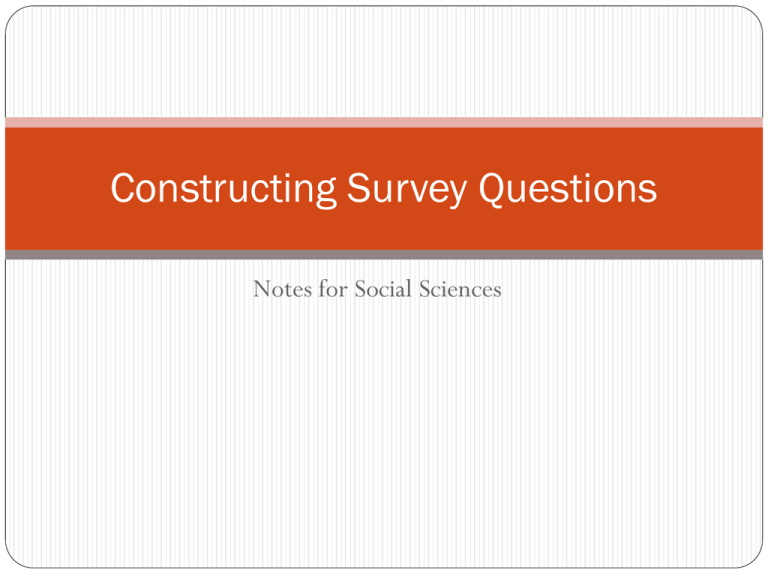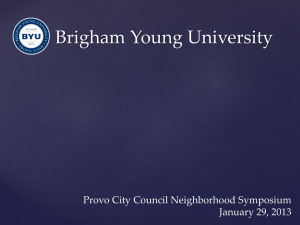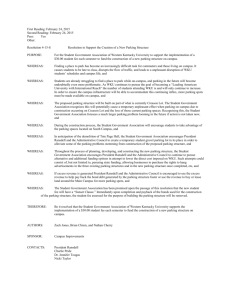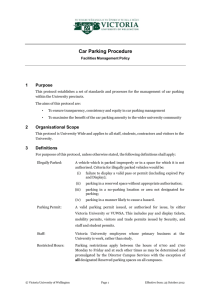
Constructing Survey Questions
Notes for Social Sciences
Types of Survey Questions
Open-ended
Open-ended questions have no one definite answer. Ex.) Why is
this issue important?
Pro:Yields quotable material
Con: Responses are more difficult to catalogue and interpret.
Closed-ended
Closed-ended questions ask participants to choose from a
specific set of answers.
Pro: Easy to quantify
Con: Limited results, may not know the answer a respondent wants to
give.
Styles of Closed-ended Questions
Likert-scale: To assess a person's feelings about something.
How important do you think standardized test scores are to a fifth-grader's education:
Not very important
Extremely important
1
2
3
4
5
Multiple-choice:
When there are a finite number of options, always give the option of “other.”
Ordinal: To rate things
Example: Please write a number between 1 and 5 next to each item below. Put a 1 next to the item that is MOST important to you
in selecting an on-line university course. Put a 5 next to the item that is LEAST important. Please use each number only ONCE.
___ a. Availability of instructor for assistance.
___ b. Tuition cost for the course.
___ c. Ability to work in groups with other students.
___ d. Quality and quantity of instructor feedback.
___ e. Number of students enrolled.
Sample Survey-Closed-ended ?s
Research Question: Do students take recycling seriously?
1. How often do you recycle?
● All the time
● When it’s convenient ● Not at all
2. Do you feel that recycling is important to the environment?
● Very important ● Important ● Somewhat important ● Not important
● No opinion
3. What would you do if you saw someone not recycling?
● Say something to them● Take out their trash and recycle it for them ● Not say anything at all
4. Are people aware of the importance of recycling?
● Very aware
● Somewhat aware
● Not aware at all
5. What factors determine your likelihood to recycle?
Convenience Cost Pressure from friends/family All of the above
None of the above
Sample Survey-Open-ended ?s
Does a college student’s religion affect the dating choices he or she makes?
1. What religion are you affiliated with?
2. Are you in a relationship? And if so, what religion is that person affiliated
with?
3. Have you ever dated someone outside your religion? If not, would you?
4. What barriers do you place on a relationship?
5. Does your family or place of worship influence your decision on whom to
date?
You will also need to decide if factors such as: age, sex, or race are relevant to
your study. Older students may be more likely than younger students to date
outside their religion. Maybe your study is examining how men and women
perceive commitment differently. You need to think about these issues before
you distribute your survey.
Types of questions to avoid
Biased questions
Biased questions are questions that encourage your participants
to respond to the question in a certain way. They may contain
biased terminology or are worded in a biased way.
Biased question: Don't you agree that campus parking is a problem?
Revised question: Is parking on campus a problem?
Types of questions to avoid, cont..
Questions that assume what they ask
These questions are a type of biased question and lead your
participants to agree or respond in a certain way.
Biased question: There are many people who believe that campus
parking is a problem. Are you one of them?
Revised question: Do you agree or disagree that campus parking is a
problem?
Types of questions to avoid, cont..
Double-barreled questions
A double-barreled question is a one that has more than one
question embedded within it. Participants may answer one but
not both, or may disagree with part or all of the question.
Double-barreled question: Do you agree that campus parking is a
problem and that the administration should be working diligently on a
solution?
Revised question: Is campus parking a problem? (If the participant
responds yes): Should the administration be responsible for solving this
problem?
Types of questions to avoid, cont…
Confusing or Wordy Questions
Make sure your questions are not confusing or wordy. Confusing
questions will only lead to confused participants, which leads to
unreliable answers.
Confusing questions:
What do you think about parking? (This is confusing because the question
isn't clear about what it is asking--parking in general? The person's ability
to park the car? Parking on campus?)
Do you believe that the parking situation on campus is problematic or
difficult because of the lack of spaces and the walking distances or do you
believe that the parking situation on campus is ok? (This question is both
very wordy and leads the participant.)
Revised question:What is your opinion of the parking situation
on campus?
Types of questions to avoid, cont…
Questions that do not relate to what you want to
learn
Be sure that your questions directly relate to what it is you are
studying. A good way to do this is to ask someone else to read
your questions or even test your survey out on a few people and
see if the responses fit what you are looking for.
Unrelated questions: Have you ever encountered
problems in the parking garage on campus? Do you like or
dislike the bus system?
Survey Terminology
Biased data—Information that leads the respondent to answer in a particular way
Respondent—Someone who answers survey questions
Investigator—The person who administers the survey
Relevant subjects—People who have knowledge about the survey’s topics
Validity—Survey measures what it says it is measuring
Convenience sample—A sample of individuals that are easiest to reach or sampling that is done easy.
Convenience sampling does not represent the entire population so it is considered bias.
Simple random sampling—A technique where we select a group of subjects (a sample) for study from a
larger group (a population). Each individual is chosen entirely by chance and each member of the
population has an equal chance of being included in the sample. Every possible sample of a given size has
the same chance of selection; that is, each member of the population is equally likely to be chosen at any
stage in the sampling process.
Sample Survey
Research Question:
Do Indian, Hindu women perceive their culture as too
traditional or strict?
Subjects
This survey was distributed to female college students in the
United States of Indian descent. There was a total of 16 replies
from women ranging in age from 18-26.
Analyze these questions
Age?
Were you born in the U.S.?
Siblings? Ages and Genders?
Have you ever dated someone who was not an Indian?
Do you plan to get married? Do you plan to marry an Indian?
Would you ever accept an arranged marriage?
Do you consider yourself traditional?
Have you tried to be more active in the community?
Have you experienced sexual discrimination through this
culture?
Discuss
The End









